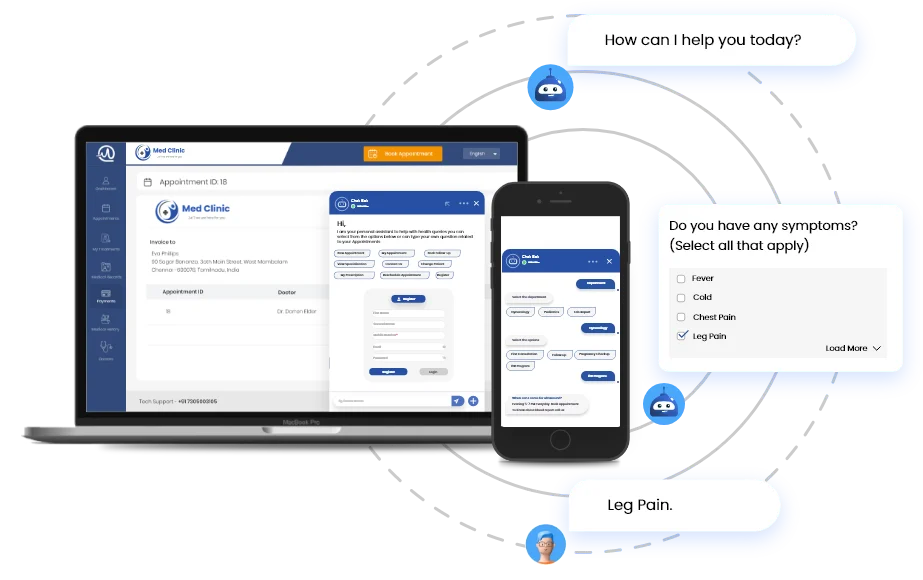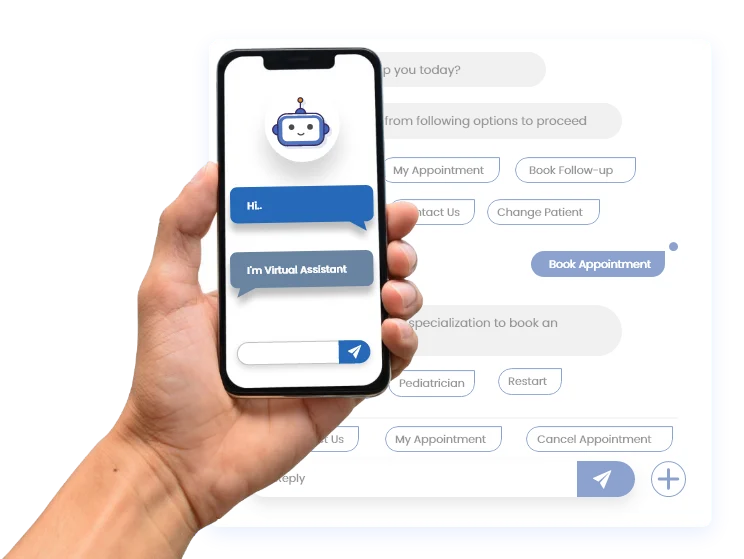The Role of Conversational AI in Healthcare
Evolving in the digital world where convenience is known to be the new loyalty for consumers across different industries, it has become a growing priority for today's healthcare consumers. Due to the demand for timely and cohesive access to care, healthcare providers are tapping into Conversational AI which is Intelligent Virtual Assistants (IVAs) to create convenience and deliver excellence for high-quality, compassionate care.
Going beyond Chatbot: Emotional Intelligence for the well-being
These days, businesses are using Chatbots for handling all type of their customer interaction. While Chatbots seek to provide enhanced customer service based on a simple rule-based conversational flow, Conversational AI's approach is more human-like with its natural language processing and machine learning capabilities. Such Intelligent Virtual Assistants (IVAs) can unburden the hectic lives of healthcare professionals and have an extensive impact on patient care. Beyond helping patients live to their optimal health, IVA makes every interaction with the medical practice rich and brilliant. Many healthcare IT solution providers in India have already started building IVAs to bolster healthcare providers.
Level up your medical practice with Latlon's NLP-powered Intelligent Virtual Assistant. From managing prescriptions to appointment scheduling, answering complex queries to checking patient symptoms, Latlon's IVA work across the healthcare spectrum, helping to alleviate the burden on the frontline.
Intelligent Virtual Assistant Use Cases
If applied appropriately, Conversational AI will have a significant impact on human well-being and the medical world.Let us run down some interesting use cases of Intelligent Virtual Assistants in the healthcare sector.
 Information Dispersal and Symptom Checker
Information Dispersal and Symptom Checker
Enabling patient engagement & improving consultation quality
One of the key implementations of Conversational AI is that it understands the symptoms that are worded by patients from human-like conversations and provide them with tips, related articles and information to help patients with initial assistance without any delay.
Intelligent Virtual Assistants also play a key role in dispersing critical medical information at an appropriate time that is determined as invaluable. A high-performance IVA provides a seamless experience and avoids hospital wait time.
Health Intelligent Virtual Assistant Market size was valued at USD 424 million in 2020 and is expected to grow at a CAGR of 36.4% between 2021 and 2027.
 Automated Appointment Booking
Automated Appointment Booking
Booking appointment with physicians is the primary and recurring task for patients. Such tasks are commonly done through a phone call to the hospital front desk or online appointment forms. Now, Conversational AI can get it done on behalf of patients in no time. IVAs makes it more exclusive by inquiring about the symptoms of patients, find physicians based on the speciality and book appointments for them in the desired time slot.
 Automated Billing and Registration
Automated Billing and Registration
Healthcare providers can use IVAs for backend billing and health insurance claims management, by integrating these processes with IVAs. This integration enables healthcare providers to generate invoices for all transactions reducing the workload of the billing department and saves time for patients.
Healthcare providers are also utilizing IVAs as a healthcare agent who answers customer queries related to coverage, claims, and procedures thus freeing the real healthcare agents from fairly simple tasks and let them focus on difficult cases and do more productive work.
 Medication Adherence & Prescription Management
Medication Adherence & Prescription Management
Helping patients be more responsible for their health.
Medication adherence is of utmost importance for many chronic patients, irrespective of the disease type and cannot be compromised for the pandemic situation. The biggest challenge will be engaging chronic patients to self-track their medication.
The IVAs potentially reduce this burden by automated reminders to improve medication adherence and promote wellness by habitual care. The IVAs have proven efficiency in triggering chronic patients to engage in habitual activity and also achieve medication adherence. The IVAs also help patients uphold their treatments by bringing awareness, and guidance into their routine.
 Autonomous Pharmacy made simple with IVAs
Autonomous Pharmacy made simple with IVAs
Patients spend a lot of time searching online to research the medication that is prescribed to them. Pharmacies can make it easier for patients by adopting IVAs to answer common medication-related questions such as drug-drug interactions, drug composition, recommended dosages based on age & weight, side effects, etc.The IVAs also can be used to create a network among pharmacies and manufacturers.
 Patient Screening, Triaging and Emergency Case Escalation
Patient Screening, Triaging and Emergency Case Escalation
Conversational AI, aside from delivering basic medical information, goes a step ahead to assist patients in need of emergency medical assistance by knowing their symptoms.
For example, non-emergency cases can be identified by the patient through the information provided by the IVA. But if the patient describes symptoms like very high blood pressure, severe injury or any emergency conditions which calls for an immediate hospital visit. The IVA relays the information and also provides the list of nearest hospitals from the patient location with the emergency hotline numbers.
In the current situation, triaging IVAs will create a huge impact on the established hospitals/clinics by performing first level patient screening effectively.
 Hospital Staff Scheduling
Hospital Staff Scheduling
The usages and benefits of Conversational AI are not limited to the patients or healthcare consumers but also the hospital staff helping them with the scheduling processes.The IVAs can smartly assist hospital administrators to access patient medical history in order to provide appropriate directions to make the patient’s next hospital visit valuable.
The IVAs, if fed and trained with the necessary data, can play a key role in minimizing the burden of hospital staff from scheduling shifts and efficiently reduce the workload of hospital staff.
Make the most of digital healthcare with Latlon's high-level Intelligent Virtual Assistant. It can answer a huge range of health-related queries, help combat health illiteracy, and aged-care challenges etc and also helps physicians to spend on the most pressing matters.
Obtain the maximum of Conversational AI through integrations.
When an Intelligent Virtual Assistant is designed as a self-contained entity, it will be considered as just another rule-based Chatbot. What makes it smarter, intelligent and human-like is the fact that it is integrated into other databases such as EHRs, EMRs, and CRMs etc. The conversational AI can form a thriving information ecosystem by integrating with calendars, omnichannel systems to improve the workflows.
Such integrations will enable the AI to surpass from being just an intelligent chatbot that automates patient screening, and patient support, to a wholesome custodian that takes care of comprehensive tasks of hospital staff. The healthcare IT solution providers will achieve greater success by designing and deploying IVA with major integrations.


Intelligent Virtual Assistant: Digital healthcare with a human touch!
There’s no doubt that conversational AI can help accomplish a more personalized approach in healthcare. While the physicians can't always provide prominent personalization, IVAs certainly can - by providing intelligent, empathetic and supportive care anytime, anywhere. This is what all patients expect – to be listened to, monitored and treated with more care and concern.
The conversational AI definitely brings a lot of benefits to healthcare by improving the quality of treatment, revolutionizing patient experience and helping healthcare providers to create a more personalized approach to their services by adding a human touch to digital health. The IVAs takes the concept of AI to a new level with voice-powered healthcare to achieve better personalization.
What’s on your mind? Would you rather incorporate Intelligent Virtual Assistant into your practice today or stay behind?
More Blogs

24th August, 2021
The healthtech industry is looking towards a bright future
The Covid-19 pandemic has accelerated the healthtech industry
Read More
3rd August, 2021
Python for the better future of Healthcare
In a regular scenario, the tech industry will announce a blockbuster
Read More
13th July, 2021
Telehealth is now a new normal for healthcare
For many industries, predominantly healthcare
Read More